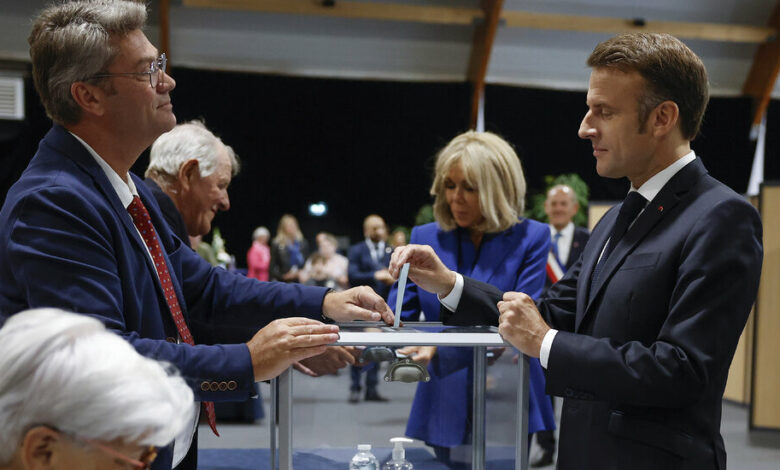Political stalemate will raise economic stakes in France

One thing was clear after France’s surprise election results on Sunday: Any new government formed by President Emmanuel Macron would face months of political paralysis. What’s less certain is whether that stalemate will further strain France’s debt-ridden economy.
The unrest has focused attention on France’s mounting €3 trillion government debt and a deficit that has ballooned to more than 5 percent of economic output, prompting a warning Monday from credit rating agency Standard & Poor’s about the creditworthiness of French government debt.
“Uncertainty looms over France’s future government architecture,” said the agency, which had already downgraded France’s debt rating on May 31, roiling the government, whose economic credibility is one of its key political assets. Should the polarization of France’s new parliament weaken the government’s ability to repair its finances, France’s debt could be downgraded again, it added.
France is facing uncharted territory after left-wing parties unexpectedly surged in national parliamentary elections, eclipsing the nationalist, anti-immigration Rassemblement National and securing the most seats in the lower house of parliament. The result left no party — including Macron’s centrist coalition — with a majority and has divided the lower house of parliament into three bitterly hostile blocs.
The French economy was already in a difficult position. Unemployment, which fell to a 15-year low of 7 percent last year, has risen again as manufacturers cut production and exports decline. Consumers, tired of persistent inflation, had also cut spending, a key driver of growth.
Mr. Macron’s government recently warned that growth would be weaker than expected this year as it sought to cut spending by more than 20 billion euros (about $21.5 billion). The European Union reprimanded France late last month for violating budget rules that limit spending and borrowing. France’s debt has soared to more than 110 percent of economic output and the country has run a deep budget deficit after the government spent heavily to protect consumers and businesses from pandemic lockdowns and high energy prices.
Macron’s opponents on the right and left seized on the blame to attack him during their campaigns. But the major parties have shown no intention of reaching a consensus, and investors worry that the new parliament will fail to pass a budget in the fall that would include deep spending cuts and avoid the risk of further downgrading France’s public debt.
“Once the dust settles, the deadlock of a hung Parliament will prove more damaging than first suggested,” Alex Everett, investment manager at Abrdn, a London-based investment firm, wrote in a note to clients. “France’s fiscal problems have not gone away. Macron’s attempt to force unity has instead fueled further divisions.”
Investors had already pushed up the government’s borrowing costs. The spread between the interest investors are charging on French debt and Germany’s has widened to the largest since the financial crisis, a sign that investors are worried about France’s ability to manage its finances. The danger is that France’s debt could grow even larger, which could lead to a faster rise in interest payments.
Complicating the picture is the left-wing alliance, the New Popular Front, which won the most seats in the lower house of parliament on Sunday. The party, a bloc of communist, green and socialist lawmakers, is pushing for a heavy “tax the rich and spread the wealth” agenda inspired by the far-left party France Unbowed, and has said it is prepared to bypass European Union budget rules if necessary to implement its position.
Unless the government raises taxes on corporations and the wealthy, the left-wing bloc is likely to reject a national budget that honors France’s pledge to Brussels and credit-rating agencies to cut the deficit from 5.1 percent of gross domestic product to 4.4 percent next year, Mujtaba Rahman, managing director of Europe for the Eurasia Group, wrote in an analysis. The group will also seek more spending on education and health care and possibly push for a hike in France’s minimum wage, he said.
But the left, though emboldened, will not have overall control, so their agenda has little chance of being adopted. That has eased fears among some investors about the economic costs of the New Popular Front’s spending program. The estimated cost would be as much as €187 billion annually, a total that would be supported by up to €150 billion in increased taxes on corporations and wealthy individuals, and the elimination of various tax breaks for companies.
“A parliament without consensus is probably the best solution for European equities,” said Claudia Panseri, Chief Investment Officer for France at UBS Global Wealth Management.
On Monday, Mr Macron’s finance minister, Bruno Le Maire, warned in a message on X that the left-wing bloc’s economic programme could plunge France into a financial crisis and economic decline. “It would destroy the results of the policy we have pursued for seven years, which has given France jobs, attractiveness and factories,” he said.
Holger Schmieding, chief economist at Berenberg Bank, said the legislative impasse “marks the end of Macron’s pro-growth reforms.” Instead, he said, Macron’s centrist coalition will likely have to accept a rollback of some of his signature initiatives — possibly including his decision to raise France’s retirement age from 62 to 64, which sparked nationwide demonstrations in 2022.
In the long run, Mr. Schmieding added, such reversals and discontent among global investors are likely to reduce growth and increase inflation in France. “Combined with potential credit rating downgrades, this would raise borrowing costs and exacerbate France’s financial problems,” he said.




